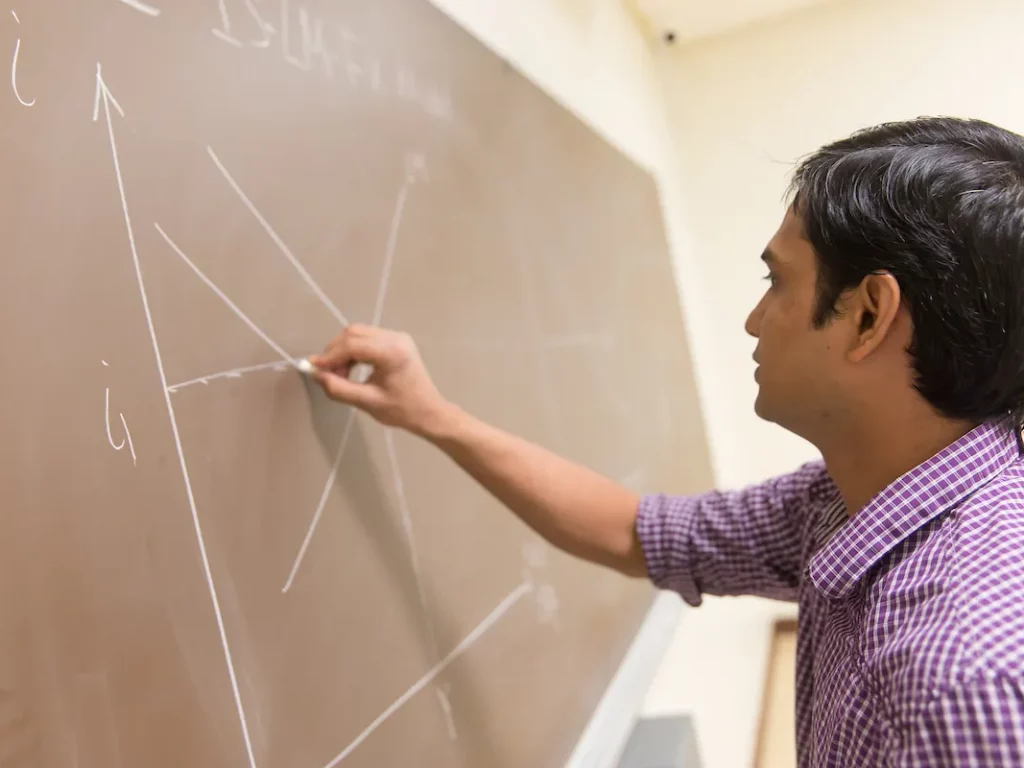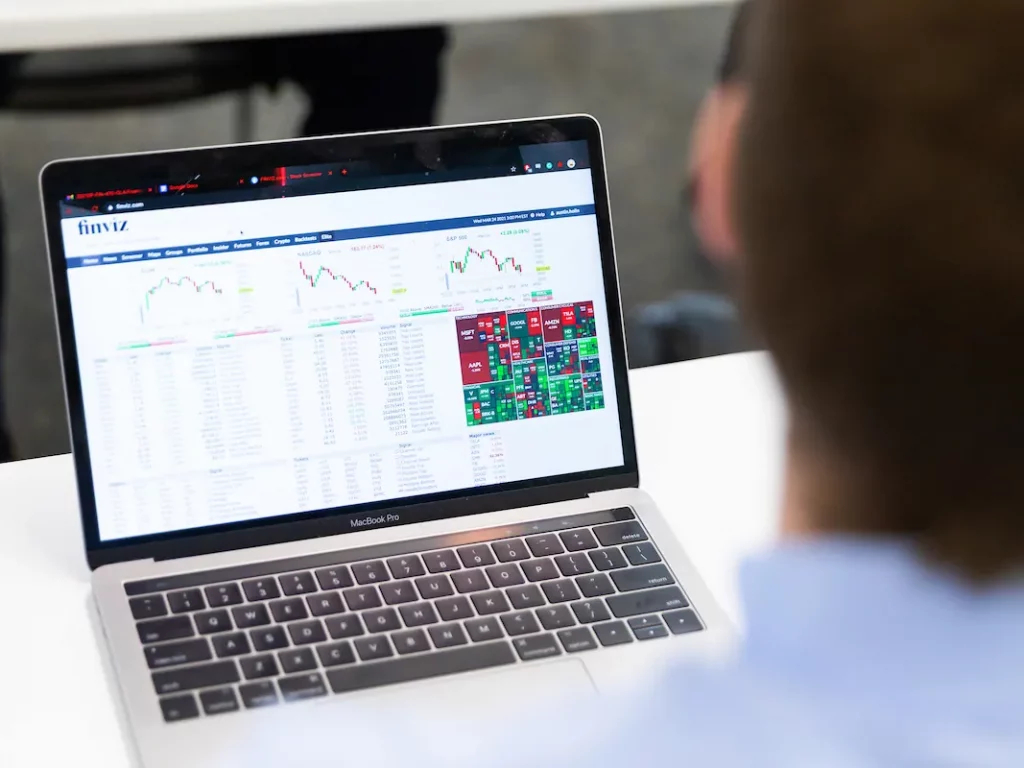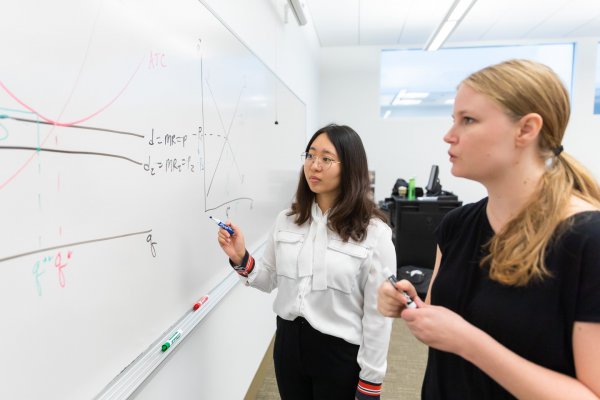International Economics Master’s (Economics and Finance)

Gain expertise in economics and finance to thrive around the globe
Are you looking to gain advanced training in the economic, financial, and policy aspects of global business and commerce? Do you seek experience in data analysis training, including in statistical software programs such as SAS?
Valparaiso University’s master’s in international economics and finance (IEF) brings together coursework in business economics, information technology, mathematics, and political science to prepare you for global careers in banking, education, health care, insurance, international development, and more. Here at Valpo, master’s in economics and finance students benefit from well-respected faculty members, small classes, and personalized attention to help you build a degree—and career—that fits your diverse and global aspirations.
Complete your graduate degree in just three semesters
Valpo’s master’s in international economics and finance is offered on campus and can be completed as a full-time student in just three semesters. If you’re a Valpo undergraduate student, you can take three international economics courses prior to enrolling in the program—helping you save both time and money.
Full and
Part-Time options available
Three Semesters to complete degree
Cohort Experience
Obtain optional certificate in SAS
Admission
Applicants must meet all the graduate admission requirements (see here) as well as demonstrate adequate preparation for successful study in the program. Applicants must also demonstrate quantitative skills by completing a college-level statistics course and a college level mathematics course at the level of algebra or higher. While the GRE test is not required for admission, applicants who score a 152 or higher on the quantitative reasoning portion of the test may use their score to demonstrate quantitative skills in lieu of the collegelevel mathematics course. Students may be eligible for admission to this program as an Early Entry student. See here for more information.
Program Requirements
- ECON 501 – Theory/Applications in Microeconomics Credits: 3
- ECON 502 – Theory/Applications in Macroeconomics Credits: 3
- ECON 538 – Economics of Financial Markets Credits: 3
- ECON 623 – International Economics Credits: 3
- FIN 620 – Financial Analysis Credits: 3
One Course From The Following Options:
- ECON 536 – Economics of Developing Nations Credits: 3
- POLS 554 – International Political Economy Credits: 3
Statistical Analysis: 6 Cr.
- ECON 525 – Applied Econometrics Credits: 3
One Course From The Following Options:
- ECON 573 – Applied Data Science Credits: 3
- STAT 543 – Time Series Analysis Credits: 3
Professional and Leadership Skills
- GRD 683 – Professional and Career Development Credits: 0
Electives: 12 Cr.
12 Credits From The Following Options:
- AMOD 610 – Business Analytics Credits: 3
- ECON 537 – Public Economics Credits: 3
- ECON 539 – Money and Banking Credits: 3
- ECON 567 – Sports Economics Credits: 3
- ECON 627 – International Monetary Economics Credits: 3
- ECON 686 – Internship in Economics Credits: 1
- ECON 695 – Independent Study Credits: 1
- IT 533 – Data Mining and Applications Credits: 3
- LS 621 – Global Leadership and Team Development Credits: 3
- MATH 522 – Optimization Credits: 3
- MATH 523 – Game Theory Credits: 3
- POLS 530 – Politics of Industrialized States Credits: 3
- POLS 532 – Politics of China and E Asia Credits: 3
- POLS 533 – Politics of Africa Credits: 3
- POLS 534 – Politics of the Middle East Credits: 3
- POLS 536 – Politics of Latin America Credits: 3
- POLS 538 – Gender and Public Policy Global Perspect Credits: 3
- SOC 519 – Research Methods I: Quant Survey Analys Credits: 3
- STAT 541 – Probability Credits: 4
- STAT 542 – Mathematical Statistics Credits: 3
- STAT 544 – Stochastic Processes Credits: 3
- STAT 561 – Introduction to R Credits: 1
- STAT 563 – Introduction to SAS Credits: 3
- Any 700-level FIN course
Total: 36 Cr.
Note: GRD 500 Graduate Academic Success is required for all new international graduate students in their first semester of enrollment.
Why choose Valpo’s master’s in economics and finance?
Gain the knowledge and know-how to analyze and address the most pressing issues facing today’s global economy. At Valpo, our master’s in international economics and finance gives you a greater understanding of the interconnectedness of worldwide markets and equips you with the tools and techniques to make financial investment decisions on a global scale.
So, how does Valpo stand out compared to other master’s in economics and finance programs? Here are four ways:
Faculty with vast academic and research expertise
Our faculty are caring, innovative, and well-respected in international economics and finance economics. They’re also expert researchers in development economics, economics of religion, environmental economics, finance economics, international economics, and labor economics. With small classes—most are fewer than 10 students—you’ll also have chances to connect and network with them and your fellow classmates.
A diverse learning environment
At Valpo, our master’s in economics and finance degree is truly global. In fact, in the past two years our graduate students have come from Afghanistan, Burkina Faso, India, Russia, and more.
STEM classification
Valpo’s master’s in international economics and finance has STEM classification, which allows international students to pursue three years of post-graduate employment in the U.S. through Optional Practical Training (OPT).
Training in SAS statistical software
Unlike other finance economics or international economics courses and programs, Valpo’s graduate degree focuses on training you on the statistical software SAS. An optional certificate in the use of SAS can be built right into your program with no additional credit requirements. The knowledge and skills you will learn from SAS have proven to be highly valuable for our recent graduates.

Finance and international economics courses you will take at Valpo
Our 36-credit-hour master’s in international economics and finance gives you a leg up as you apply economic analysis to real-world financial problems. You’ll pursue finance and international economics courses in topics such as:
- Economic theory
- Statistical analysis
- Professional and leadership skills
- Electives such as Economics of Developing Nations, International Monetary Theory and Applications, Introduction to SAS, Statistics for Decision Making, and more.
Beyond our finance and international economics courses, many of our graduate students gain additional experience through internships, research opportunities, and teaching assistantships. These are great opportunities to put your learning into action and prepare for careers in finance economics, as an international economist, and much more.

What can you do with a Valpo master’s in international economics and finance?
Whether you’re considering a career as an international economist or researcher—or in economic development, international finance, public policy, and more—our master’s in economics and finance will equip you with advanced training in both theory and practice. You’ll gain skills that are applicable to numerous fields. Our recent graduates are working in banking, communications, education, international development, wealth management, and more.
More about careers in finance economics and as international economists
Nearly 100% of Valpo master’s in economics and finance graduates find jobs with a year of graduation.
Employment of economists—including as international economists—is projected to grow 13% over the next decade, according to the U.S. Bureau of Labor Statistics.
Graduates of master’s degree programs who pursue careers as economists and international economists, on average, earn $106,721 a year, according to indeed.com.

Hear from our master’s in international economics and finance graduates
“Valpo’s master’s in international economics and finance program has given me a well-rounded understanding of economics at the global level. The statistical research projects and supplementary finance courses enhanced my understanding of core economics concepts and gave me valuable quantitative skills. These things, combined with guidance from knowledgeable and helpful professors, have made my degree a worthwhile investment as a young professional.”
— Hannah Birky ’18, IEF
Finance Manager, JLL
Get started on your master’s in economics and finance
Take the next step toward earning your graduate degree. We have the resources to answer all your questions and help you get started on your finance and international economics courses.
